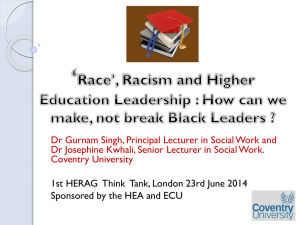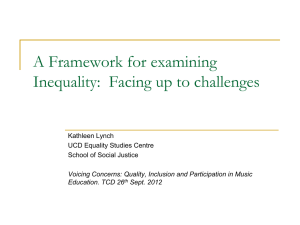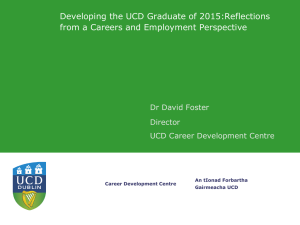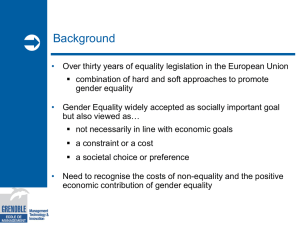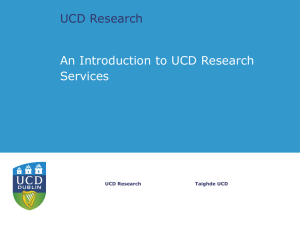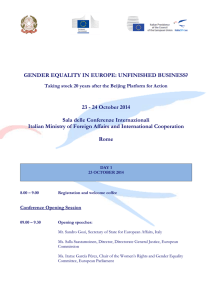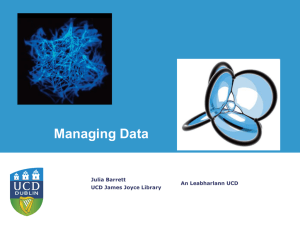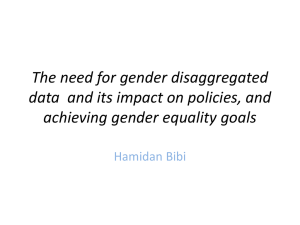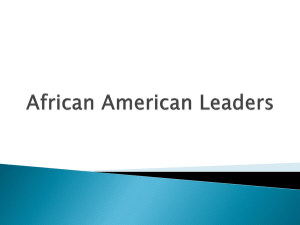here - University College Dublin
advertisement
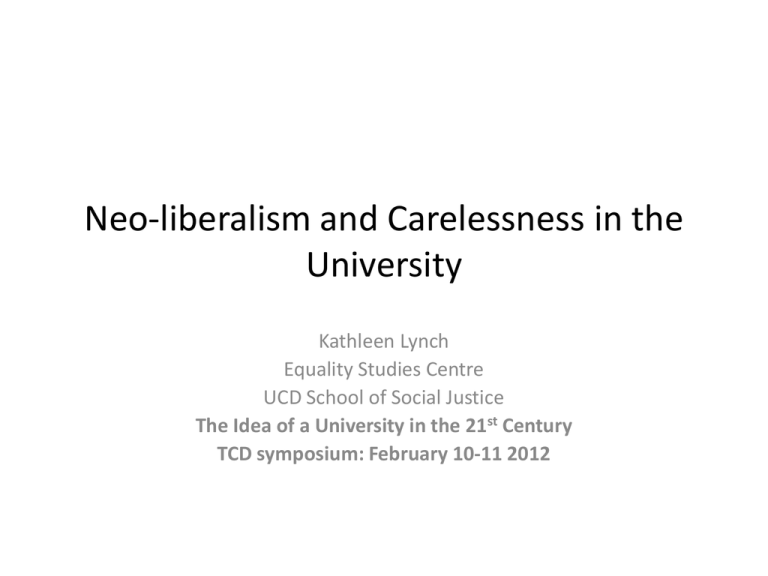
Neo-liberalism and Carelessness in the University Kathleen Lynch Equality Studies Centre UCD School of Social Justice The Idea of a University in the 21st Century TCD symposium: February 10-11 2012 Outline • If Universities are Cost Effective why are they being told they are inefficient? • The Role of Global Capital in defining the Role of the University - rise of individualised and corporatised academic capitalism • Influence of Multilateral Agencies • The Consequences of Marketisation – Culture of the University – Anti-egalitarian developments – Carelessness – impact on women, carers, students • Conclusions Equality Studies Centre, UCD School of Social Justice 2 EXPENDITURE on Higher Education in Ireland • Total public expenditure on tertiary education institutions as a percentage of GDP has declined despite increased participation rates • 1998 1999 • 1.30 1.35 2000 1.45 2001 1.28 2002 1.20 2003 1.11 2004 1.14 2005 1.13 2006 1.0 • Sources: EcoFin (Country report for Ireland (2010: 4-5) and OECD (2009)Education at a Glance, Table 82.4) Equality Studies Centre, UCD School of Social Justice 3 Efficiency of Irish Higher Education and the Standing of Irish Graduates • UK, the Netherlands, Ireland, Sweden, Finland and Denmark are the most cost efficient countries for higher education in Europe – Source: Efficiency and effectiveness of public expenditure on tertiary education in the EU (European Commission, ECOFIN Study, 2010: 36) • Ireland was ranked highest of all countries in the international recruiter review of graduate employability and 2nd highest in the international peer review of graduate quality THES-QS University rankings – Source: (National Strategy for Higher Education (Hunt , 2010: 29) • YET, the Hunt Report argues: ‘It is envisaged that a move to funding for outcomes within a quality-assured and performance-based framework will generate a need to increase productivity and to incorporate greater flexibility in employment contracts’ (ibid:103) Equality Studies Centre, UCD School of Social Justice 4 Global Capital defining the Role of the Universities • Global movement to make higher education a tradable service rather than a public service • Reason: Declining returns of capital from manufacturing, agriculture and other tradable activities – The Services Directive 2006 (EU) moving towards marketisation – General Agreement on Trade and Services (GATS)objective is the ‘liberalisation’ of trade in services – reduce state investment and placing lucrative areas of education (higher education) on the market – Outcomes: Once education services are defined as tradable under the GATS they are deregulated and legal, political and fiscal quality controls are greatly reduced. Equality Studies Centre, UCD School of Social Justice 5 ‘Edupreneurs’ Pressure to introduce For-Profit Education • Increasing pressure in the US to promote for-profit education at all levels as it promotes the tradability of services (Cato Institute, Apollo, Kaplan etc.) • Merrill Lynch estimated that the for-profit education market will grow at a rate of 13 percent per year in the US • “If the typical class enrolls 20 students at $800 tuition each, revenue equals $16,000. If the faculty member is paid $1,600 to $2,000, that leaves at least $14,000 to cover all other costs plus profit… UOP is a veritable money machine" [Yung, 2004]. ” (a quote from the University of Phoenix for-profit university with over 400,000 students) Equality Studies Centre, UCD School of Social Justice 6 Market-led higher education is official policy: The Lisbon Agreement and the Hunt Report • "Knowledge and innovation are the engines of sustainable growth in Europe today, and universities are crucial for achieving the goals set out by the …European Council. ……….. The Commission invites national decision makers to set out measures that would enable universities to play a full role in the Lisbon strategy". Ján Figel', European Commissioner for Education, Training, Culture and Multilingualism http://ec.europa.eu/education/highereducation/doc1324_en.htm/downloaded March 8th 2010 • ‘Irish higher education will also need to deepen the quality and intensity of its relationship with enterprise and adjust its strategy regularly in response to global change …….the people who enter higher education….are the job creators, policy makers, social innovators and business leaders of the future……. they will be the productive engine of a vibrant and prosperous economy’ (Hunt: 2010: 39 on The Mission of Higher Education in Ireland)…. Equality Studies Centre, UCD School of Social Justice 7 Neo-liberal view of Education an optional ‘commodity’ on the Market • The goal of neo-liberalism is the reduction in the cost to capital (i.e. business) of expenditure on public services • The market should replace the state as the provider of all services Outcomes: Loss of resources to fund public services such as education leads to: – social class-based segregation in education – a generalised lack of respect and support for public services and those who work in them and use them – A system in which private sector providers cannot be held to account in the same way as public providers 8 Consequences of Marketisation: the proletarianisation of academic life • The casualisation of the academic and teaching staff is a close correlate of market-led education (in the UK 45% of academics are on fixed term or hourly contracts (Baker and Brown, 2007 Rethinking Universities ) • An estimated 95% of academics are part-time in the University of Phoenix compared with an average of 47% nationally in the US.. http://www.phoenix.edu/students.html. • We do not know the % of academics are on contract and/or part-time in Ireland – the lack of data from the HEA is a form of control • Lessons from Australia - impoverishment of students • The US Government Accountability Office (GAO, 2010) found that the courses in for-profit colleges cost several multiples of what they cost in comparator public colleges http://www.gao.gov/new.items/d10948t.pdf. Equality Studies Centre, UCD School of Social Justice 9 Neo-liberal values impact on the culture of higher education • In adopting business models of operation the university and other higher educational bodies generally institutionalise commercial values both in research and teaching and in their systems and processes: – Universities move from being centres of learning and scholarship to service-delivery operations with productivity targets – The processes legitimates the pursuit of individualised economic selfinterest and credentials among students, and career interests among staff – – individualised academic capitalism is utterly Care-Less • Student and staff idealism to work in ‘the public interest’ is diminished when universities begin to function as competitive business-oriented corporations Equality Studies Centre, UCD School of Social Justice 10 Eliding the difference between commercial and public interests in research Public-private partnerships are promoted in lieu of state support for research–exemplified in state subvention of commercially-driven research » Consequences -elision of the difference between public interest-driven scholarship and for-profit-led research : 50% of life sciences faculty staff in the US are consultants to industry (Lieberwitz, R. (2007)., in Paula E. Stephan and Ronald G.Ehrenberg, eds. SCIENCE AND THE UNIVERSITY (University of Wisconsin Press) » Philanthropy is promoted as a substitute for taxation - a new form of institutionalised corporate charity » Consequences -emergence of philanthro-capitalism and private sector control over civil society institutions including universities. Agenda is set by the private interests of those funding the foundations (Michael Edwards, (Just Another Emperor; Myths and Realities of Philanthrocapitalism, 2008) Equality Studies Centre, UCD School of Social Justice 11 New managerialism – impact on equality in higher education • Efficiency is prioritised over equality of access, participation and outcome: Irish examples • Closure of the Higher Education Equality Unit as an independent entity; • No HEA surveys of Equality of access and participation for several years • No published data on the staff profile of those in higher education since 2004 (no data on gender, ethnicity, disability etc., tenure status of staff) • Introduction of the HPAT – which was designed to discriminate against women at entry to medicine – no published data on this • Budget 2012 – Serious attack on Low Income students maintenance grants are removed for all graduate students; fees will only be paid for Masters students whose families have a net income of €22,703 • Silence from the IRISH UNIVERSITIES! Equality Studies Centre, UCD School of Social Justice 12 Carelessness in Higher Education • Discourse of new managerialism implies greater opportunities for gender equality in management – new opportunities in a more ‘rational’ ‘open’ system • BUT New managerialism assumes a Rational Economic Actor (REA) model of the citizen; ignores the reality of human dependency and interdependency • Senior managers and senior academics are defined in practice as people with 24/7 time for the organisation: ‘Care-Free’ Workers – this ignores the gendered order of caring in society • Source: Lynch, K. , Grummell, B. and Devine, D. (2012, May) New Managerialism: Gender, Commercialisation and Carelessness. London: Palgrave Macmillan Equality Studies Centre, UCD School of Social Justice 13 Care-less cultures in higher education: work without time boundaries • And to be quite honest, I mean, since I came into the post I’d say on average I work an 85 hour week, between 75 and 85 hours a week….You do work phenomenal hours and you are probably hearing this as well from school principals. That is another issue for women who still have caring responsibilities. I mean I don’t, …(Senior female post holder higher education and an assessor) – I was working pretty much seven days a week, or six and a ½ days a week, and my stated objective was to get down to five days a week while doing the other things.. (Senior male post holder in higher education) • Also in universities for women faculty members the fact that most promotion now prioritises research means that it is very, very difficult for …women to be able to devote the amount of time that seems to be necessitated for producing research and publications…I really think that society needs to remodel how it looks at work (Senior female post holder, higher education) 14 New Managerialism : having children: deciding not to have children – a women’s issue • It broke my heart so that was the end.. and I determined, no more children, I just couldn’t cope with it, it was heartbreaking. I didn’t feel that I could tell them that I was breastfeeding and I needed a cup of tea or a glass of water or something. ….. But they were very kind decent people, I’m not saying for a second, this wasn’t bias or anything it’s just that they had never faced this…(Female senior post holder speaking about holding a senior post and returning from maternity leave). …. • I mean it was a big influence in only having one, I never had another one and it wasn’t because…[personal reasons given] but I made a conscious decision that I couldn’t get tenure and be pregnant and have a second child, it was just not going to happen. (Female senior post holder at a higher education institution) • …Well we don’t have kids so that made it a lot easier. You wouldn’t maybe make a decision as quickly if you had a family to move around ….(Female senior post holder at a higher education institution) 15 Management culture in higher education: Hiding care and facing the consequences Being the primary carer, parenting alone and hiding it • I didn’t find that very easy and I didn’t feel comfortable asking for any sort of accommodation to be made for it and indeed I didn’t ask for accommodation to be made for it. But there would have been times when it would have been nice to manage things like my son being ill or this kind of stuff because he was quite young. (Female senior post holder in higher education) Selection criteria that ignore care realities - for women • …It has tended to be very criteria-based and once you go criteria-based, you tend to get out of that [direct discrimination]. However, of course by the mere fact that you are looking for management experience in terms of criteria…you may in itself be limiting your field, ….. There are less women with that experience so you are by definition excluding them……In my optimistic days I think it is changing slightly, not hugely I think it is still very much a male -dominated society... (Female assessor for senior posts at a higher education institution). 16 Conclusion – the Care Ceiling • • Under new managerialism there is a growing focus on measured performance regardless of care costs to people in senior management and to those who work with them A Care-Less view of the successful academic has becomes the norm as one moves up in seniority in higher education; 24/7 culture of paid work – Care-less academic model is excluding primary carers, the majority of whom are women A Care Ceiling is in operation which is replacing the glass ceiling • • Consequences: ‘Care Commanders’ make decisions in HE - As our Domain Assumptions (arising • • • from our biography) influence our Paradigmatic Assumptions – research and teaching priorities are set by those who are free-riders on others’ every-day care work What is being eroded under new managerialism and neo-liberalism is not only the idea of education as a right and a public service but an ethos of care in relation to students and staff 17 Care-less cultures deny our deep dependencies and interdependencies as human beings • ‘While conditioned in fundamentally significant ways by cultural considerations, dependency for humans is as unavoidable as birth and death are for all living organisms. We may even say that the long maturation process of humans, combined with the decidedly human capacity for moral feeling and attaching, make caring for dependents a mark of humanity.’ (Kittay,E. Love Labor, 1999: 29). 18 Role of the University ‘It is the University that must guide democracy into the new fields of arts, literature and science. It is the university that fights the battle of democracy, its war-cry being: ‘Come let us reason together’. It is the University that …goes forth with buoyant spirit to comfort and give help to those who are downcast, taking up its dwelling in the midst of squalor and distress’ (William Rainey Harper, founder of the University of Chicago, in his 1899 Charter day address at the University of California. (Harkavy, Ira 2005: 4). Equality Studies Centre, UCD School of Social Justice 19

